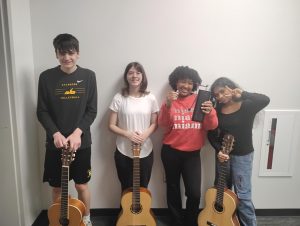Rhetoric inspires: the power of speech
April 13, 2015
Rhetoric, or “ the art or skill of speaking or writing formally and effectively especially as a way to persuade or influence people,” goes back to ancient Greece and Rome. Famous figures such as Aristotle and Cicero have effectively used rhetoric in their treatises.
Rhetoric has made its way into many famous American speeches such as “The Gettysburg Address” and “I Have A Dream,” and more recently, in a speech given by President Barack Obama at the 50th anniversary of “Bloody Sunday.”
“Bloody Sunday” occurred in 1965 when a group of 600 people, led by John Lewis decided to march to Montgomery, Alabama. However, as the demonstrators reached the Edmund Pettus Bridge, they met a wall of police officers armed with tear gas, clubs, and guns. The troops beat and tear gassed the protesters.
Days after, thousands of demonstrators led by Martin Luther King Jr., started a peaceful march from Selma, Alabama to Montgomery, Alabama; in response, Congress enacted the voting Rights Act of 1965.
One of the victims includes Amelia Boynton Robinson, who was beaten and left for dead at the foot of the Edmund Pettus Bridge. The 103-year old civil-rights activist was present for President Obama’s speech last week.
The speech commemorates the activists who took part in the historic march. It also acknowledges the current state of race relations in the United States, referencing the “Black Lives Matter” movement.
There are parallels found between Obama’s speech, “The Gettysburg Address,” and “I Have a Dream:” America is still changing.
“First and foremost, we have to recognize that one day’s commemoration, no matter how special, is not enough. If Selma taught us anything, it’s that our work is never done – the American experiment in self-government gives work and purpose to each generation,” Obama said.
The speech also self-evaluated the status of race relations.
“Because of what they did, the doors of opportunity swung open not just for African-Americans, but for every American. Women marched through those doors. Latinos marched through those doors. Asian Americans, gay Americans, and Americans with disabilities came through those doors,” Obama said.
“Their endeavors gave the entire South the chance to rise again, not by reasserting the past, but by transcending the past.”
This aligns with the ideals in “The Gettysburg Address,” and “I Have A Dream.” The power of language is to move and inspire an audience. The speeches address the nation as a whole. And as a whole, building up from the achievements of the past, the nation must move forward.
“ …We are strong enough to be self-critical, that each successive generation can look upon our imperfections and decide that it is in our power to remake this nation to more closely align with our highest ideals [.]”







